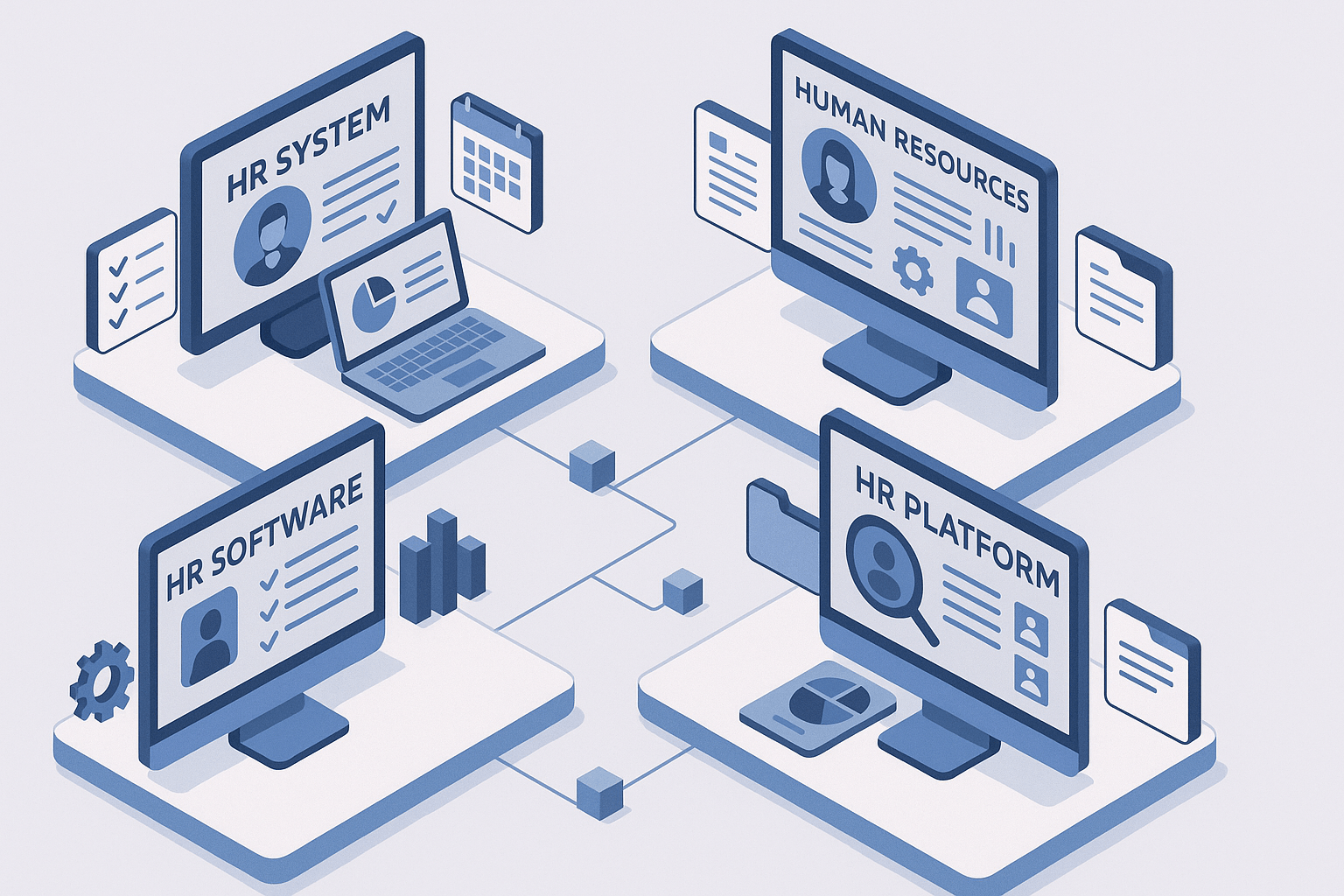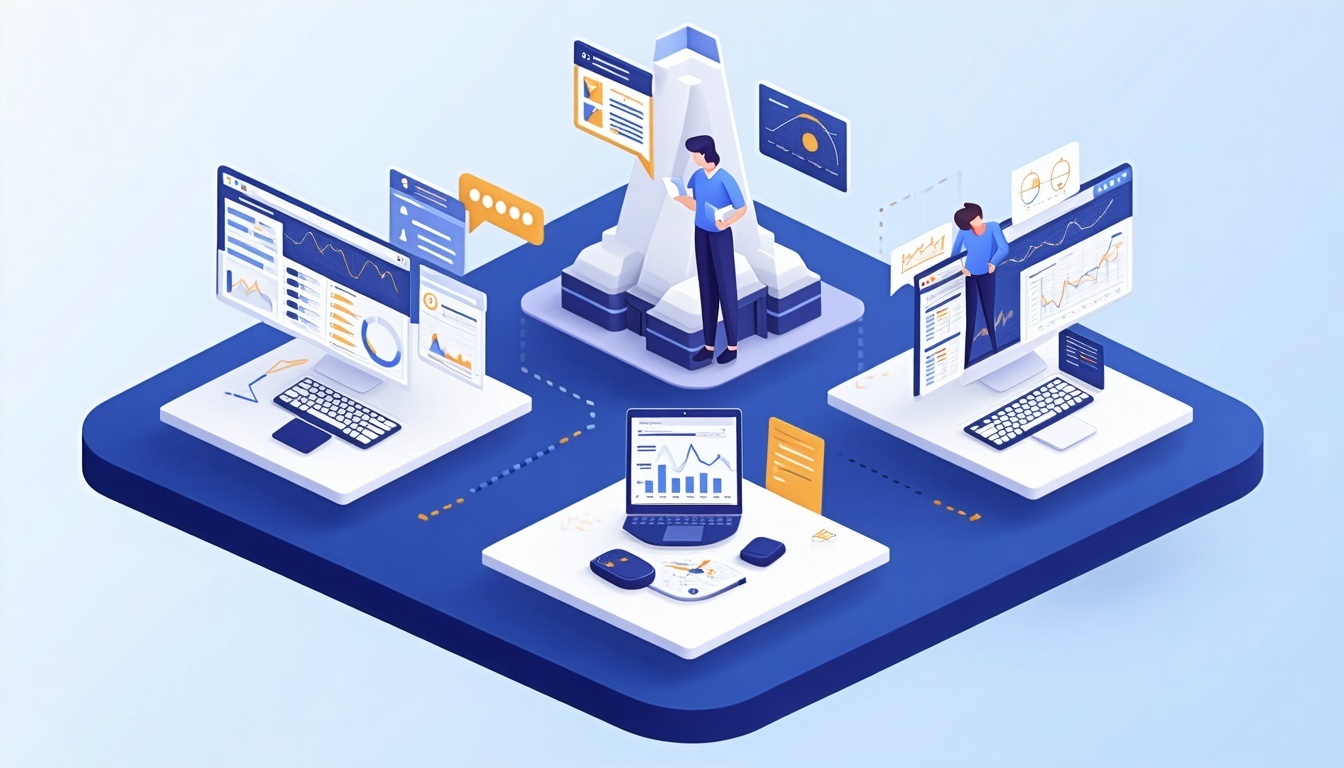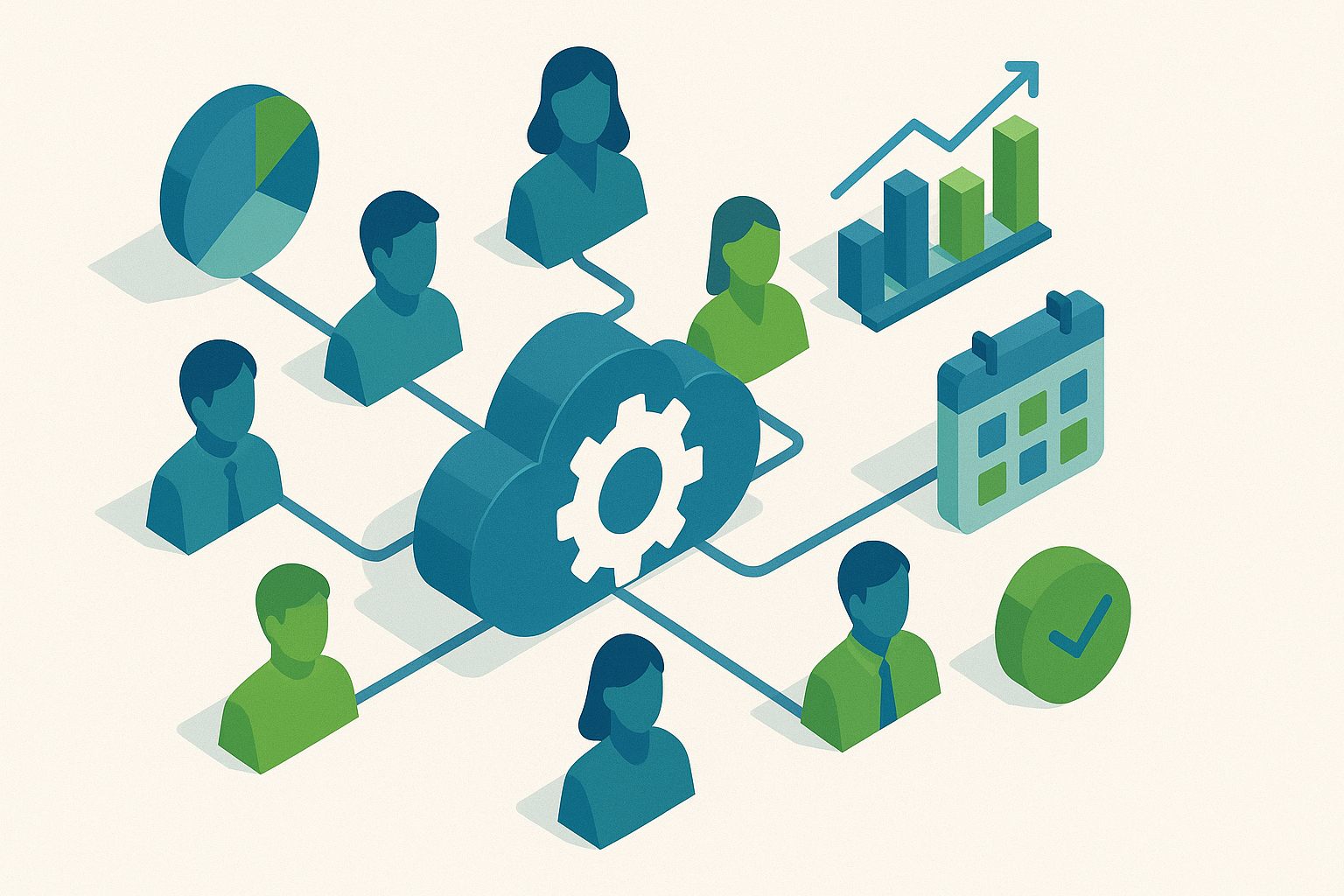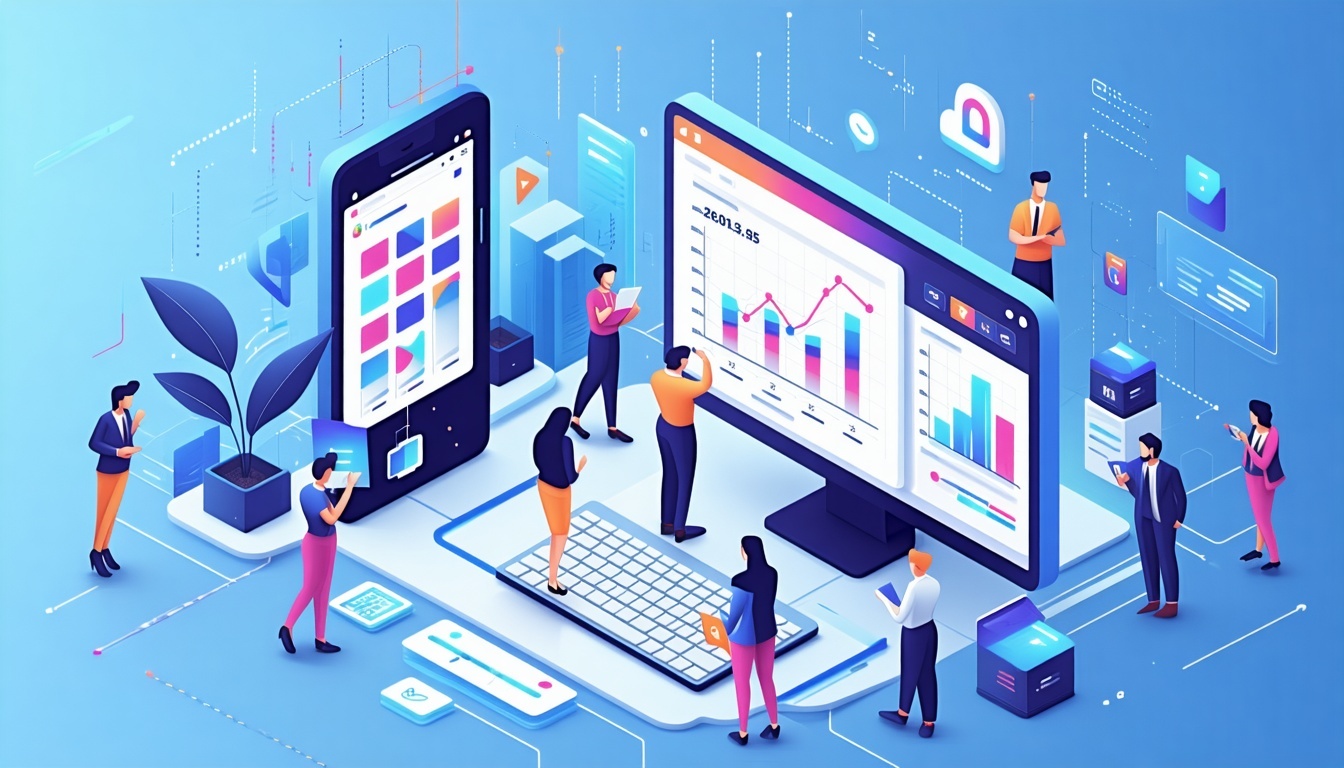What is Human Capital Management and Why Is It Critical for Business Success?
April 11th, 2025
6 min read

Are you struggling to attract and retain talented employees? Do payroll, benefits, and employee training feel overwhelming and disconnected? You're not alone in this challenge, as many businesses find Human Capital Management (HCM) complex yet essential for sustainable growth. The modern workplace demands a strategic approach to managing your workforce, one that goes beyond traditional HR functions to truly optimize your most valuable asset – your people. At Lift HCM, we've spent decades simplifying workforce management systems and have witnessed firsthand how a clear HCM strategy transforms employees into powerful drivers of organizational success.
In this article, you'll discover exactly what HCM encompasses, its critical components, and why it's indispensable for businesses seeking competitive advantage in today's talent-driven market. By the end of this article, you'll walk away with practical strategies to enhance your HR processes, boost employee engagement, and drive sustainable business growth through effective people management.
Table of Contents
- What is Human Capital Management (HCM)?
- Key Components of HCM
- Why HCM is Critical for Business Success
- The Role of Technology in Modern HCM
- Implementing a Successful HCM Strategy
- The Future of HCM and Your Business
What is Human Capital Management (HCM)?
Human Capital Management (HCM) is the comprehensive strategic approach to effectively managing, developing, and optimizing your workforce to drive business success. It represents a fundamental shift in perspective, viewing employees not merely as costs but as valuable investments that generate substantial returns when properly developed and engaged. This holistic approach encompasses everything from talent acquisition and development to performance management and strategic workforce planning, all designed to maximize both employee potential and organizational outcomes.
Modern HCM solutions integrate advanced technologies with proven HR strategies to create seamless, data-driven workforce management systems. Unlike fragmented HR processes of the past, today's HCM approach unifies all people-related functions under one strategic umbrella, enabling better decisions based on comprehensive workforce analytics.
Key Distinctions Between HCM and Traditional HR:
- Strategic Focus:
- Traditional HR: Administrative efficiency and compliance
- HCM: Workforce optimization aligned with business strategy
- Technology Utilization:
- Traditional HR: Basic systems for record-keeping
- HCM: Integrated platforms with analytics and automation

Key Components of HCM
Talent Acquisition and Recruitment
Finding and securing the right talent quickly has become increasingly challenging in today's competitive job market. Companies with advanced talent acquisition strategies are 2.5 times more likely to achieve financial targets and 3 times more likely to maintain high employee engagement, making this a critical HCM component.
Modern talent acquisition goes beyond simply filling vacancies – it involves creating a compelling employer brand and implementing sophisticated screening processes to identify top performers. Organizations implementing strategic recruitment approaches reduce time-to-fill by 30-40% while significantly improving quality of hire and retention rates.
Modern Talent Acquisition Features:
- AI-Powered Candidate Matching: Automated screening algorithms that identify ideal candidates
- Streamlined Application Processes: Mobile-friendly platforms with one-click application options
- Data-Driven Decision Making: Recruitment analytics dashboards that show source effectiveness
Employee Onboarding and Development
The transition from candidate to productive team member represents a critical period that significantly impacts retention and performance. Research shows that organizations with structured onboarding experience 82% higher new hire retention and 70% greater productivity from new employees.
Effective development extends this initial investment through ongoing learning opportunities and career pathing designed to maximize each employee's potential. Companies that implement comprehensive learning ecosystems report 3.4 times faster skill acquisition for critical capabilities compared to those relying primarily on conventional training approaches.
Payroll and Benefits Administration
Accurate, efficient payroll processing represents a fundamental expectation of employees, with errors potentially damaging trust and engagement. Modern HCM solutions integrate sophisticated payroll systems that ensure compliance, accuracy, and visibility while reducing administrative burdens across multiple jurisdictions.
Benefits administration through an HCM platform transforms from a confusing process to an intuitive, personalized experience. Self-service portals allow employees to compare options and make informed decisions without HR intervention. Companies implementing these platforms report administrative savings of 15-20% while significantly improving employee satisfaction.
Performance Management and Engagement
Traditional annual performance reviews have given way to continuous feedback systems that provide timely, actionable insights. Modern HCM performance management tools facilitate regular check-ins and real-time feedback that create a culture of ongoing development, with 78% of workers reporting higher motivation when receiving regular feedback.
Organizations with highly engaged workforces report 21% higher profitability and 59% lower turnover, according to Gallup research. The integration of performance and engagement within a unified HCM approach creates powerful synergies, as improvements in one area positively impact the other in a virtuous cycle.
Performance Management Evolution:
- From Annual to Continuous: Regular check-ins replace yearly reviews
- Data-Driven Insights: Advanced analytics and engagement measurement tools
- Development Focus: Growth-oriented conversations rather than backward-looking evaluations
Why HCM is Critical for Business Success
Driving Productivity and Reducing Costs
Effective Human Capital Management directly impacts productivity by streamlining processes and creating environments where employees can perform at their best. By automating routine tasks, HCM solutions free employees and managers to focus on value-adding activities. Studies show organizations with mature HCM practices achieve 18% higher productivity compared to those with traditional approaches.
Employee turnover creates substantial costs through lost productivity and recruiting expenses – with replacement costs ranging from 90-200% of annual salary. Modern HCM strategies address this challenge by improving the employee experience, identifying engagement risks early, and enabling proactive interventions. Organizations implementing comprehensive solutions report average retention improvements of 15-20% across key talent segments.
Ensuring Compliance and Strategic Advantage
The regulatory environment surrounding employment continues to grow more complex, creating a challenging compliance landscape. Modern HCM systems incorporate compliance safeguards throughout all workforce processes, from applicant tracking through retirement, automatically applying appropriate rules based on location and employee classification to significantly reduce legal exposure.
Beyond risk reduction, effective HCM provides strategic competitive advantages through superior workforce capabilities and deployment. As organizations increasingly compete based on talent, innovation, and agility, HCM approaches deliver critical advantages by aligning workforce initiatives with business objectives and optimizing human capital investments to support strategic priorities.
Strategic Benefits of Advanced HCM:
- Talent Optimization: Matching the right skills to the right roles at the right time
- Agile Workforce Planning: Quickly adapting to changing business conditions
- Data-Driven Decision Making: Using workforce analytics to guide strategic choices
The Role of Technology in Modern HCM
Cloud Platforms and AI-Powered Analytics
The evolution to cloud-based HCM platforms represents a fundamental shift that enables greater flexibility, accessibility, and analytical capability. Modern solutions provide anytime, anywhere access through secure, mobile-friendly interfaces that support today's distributed work models. Organizations implementing fully integrated platforms report efficiency improvements of 22-25% in HR operations.
Below is a dual-axis line chart showing the correlation between HCM adoption rates and employee satisfaction scores over time (2018-2024), demonstrating the positive relationship between these metrics.
Artificial intelligence and advanced analytics have transformed HCM from an intuition-driven function to a data-powered strategic resource. AI-enabled tools provide predictive insights about flight risk, performance potential, and engagement levels that enable proactive talent management. Natural language processing enhances employee experiences through conversational interfaces and sentiment analysis, while machine learning continuously improves predictive models through exposure to organizational data.
Mobile Accessibility and User Experience
The shift toward mobile-first HCM design reflects fundamental changes in how employees expect to interact with workplace systems. Modern platforms prioritize smartphone and tablet accessibility, enabling anytime, anywhere completion of essential tasks from time tracking to performance feedback. This mobility supports flexible work arrangements while improving process completion rates.
Mobile accessibility particularly impacts manager effectiveness by enabling real-time coaching and approval processing regardless of location. Organizations implementing mobile-optimized manager tools report 35% faster approval cycles and significantly higher satisfaction with HR processes. The most effective strategies focus on task simplification rather than merely shrinking desktop interfaces, creating purpose-built experiences optimized for specific use cases.
Mobile HCM Usage Statistics:
- 76% higher engagement with self-service tools
- 68% reduction in HR inquiry volume
- 47% increase in real-time feedback delivery
Implementing a Successful HCM Strategy
Assessment and Planning
Before implementing new HCM initiatives, organizations should conduct thorough assessments of their current capabilities, processes, and technologies. This evaluation establishes a clear baseline from which to measure improvement while identifying specific opportunity areas for immediate focus. Comprehensive assessments examine technology infrastructure, process efficiency, data quality, and strategic alignment.

Successful implementation requires careful consideration of several critical factors beyond technology selection, including organizational readiness and change management capacity. Executive sponsorship represents perhaps the most important success factor, with organizations having strong leadership support reporting 68% higher success rates for major HCM transformations compared to those with limited engagement.
Measuring Success and Optimizing Results
Establishing clear success metrics before HCM implementation creates accountability while enabling value demonstration to key stakeholders. Comprehensive measurement frameworks include efficiency metrics (process time reduction, cost savings), effectiveness indicators (quality of hire, retention improvement), and strategic outcomes (revenue per employee, innovation rates).
Regular measurement cadences with consistent methodologies enable trend identification and continuous improvement opportunities. Leading organizations establish dashboards that provide both operational metrics for process optimization and strategic indicators for executive visibility. These integrated views connect operational improvements to business outcomes, maintaining executive support for ongoing HCM investment.
Essential Success Metrics:
- Operational Efficiency: Process completion times, self-service utilization rates
- Talent Effectiveness: Quality of hire, time to productivity, retention by performance tier
- Strategic Impact: Revenue per employee, profit per employee, innovation metrics
The Future of HCM and Your Business
Human Capital Management has evolved from an administrative HR function to a strategic business imperative that directly impacts competitive position and financial performance. As organizations increasingly compete based on talent and innovation, effective HCM approaches provide critical advantages through superior workforce capabilities and experiences.
At Lift HCM, we partner with organizations to implement comprehensive human capital management solutions aligned with their specific strategic priorities. If you're ready to transform your workforce management from administrative burden to strategic advantage, we invite you to explore how our HCM solutions can support your business objectives!
Caitlin Kapolas is a results-driven professional with a strong background in account management and retail. She is dedicated to improving client experiences and building lasting relationships. Caitlin excels in identifying client needs, resolving issues, and implementing customized solutions that drive value. Her effective communication skills ensure high client satisfaction and loyalty, making her a trusted advisor and partner in meeting client needs with precision and professionalism.



.png?width=473&height=315&name=Digital%20Employee%20Experience%20DEX%20in%20HCM-21%20(1).png)






















